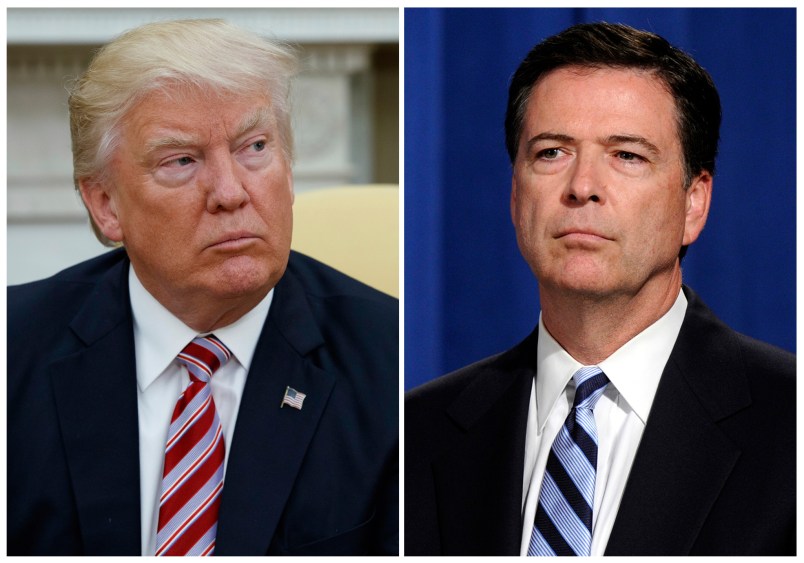I will return to this in more depth later. But I wanted to address a key point about yesterday’s Inspector General report on James Comey and his memos about President Trump. As I noted yesterday, the report is typical of Inspector General Michael Horowitz — basically report the facts, try to avoid discussion of facts or questions that are unhelpful to President Trump and spin the facts in as friendly a way as possible to President Trump. Indeed, beyond Horowitz himself, the report is emblematic of how even seemingly apolitical appointees (Horowitz was appointed under Barack Obama) and members of the bureaucracy routinely bend their duties toward those in power.
Yesterday I was amazed to see Chuck Todd suggest to Comey’s friend and public supporter Benjamin Wittes that Bill Barr’s apolitical bona fides had been reestablished by the fact that Barr did not prosecute Comey. This is an astonishingly stupid suggestion, which again underlines the way Trump’s criminality and bad acting gets normalized to create an environment in which the major media can operate, to create a bothsidesist equilibrium.
But let me address a key point.
We know from October 2016 that James Comey is in the habit of departing from established rules and procedures when he believes unique circumstances and his own sense of his own rectitude require it. We know from his actions at the end of October 2016 that this can lead to outcomes which are both substantively and procedurally catastrophic.
It also goes without saying that of course it departs from FBI guidelines to take possession of Bureau work product memos or release them to the press. This goes without saying. That is textbook for any bureaucracy, especially a law enforcement or intelligence bureaucracy.
But the reality is that Comey was acting as whistleblower. Ignoring the context of his actions is at the center of Horowitz’s presentation. It is a dead certainty to anyone with their eyes open that he did the right thing in bringing those memos to public light.
Let’s remember where things stood. President Trump entered office with abundant (and later confirmed) evidence that he and his campaign had carried on extensive and highly abnormal contacts with an adversary foreign power that aggressively interfered in the presidential election on Trump’s behalf. We are all boiled frogs at this point on just how shocking and dangerous a reality that was and is.
More evidence came to light on that front in Trump’s first months in office. Trump repeatedly pressured Comey to end a criminal investigation into his current (and then former) National Security Advisor who was at the center of that Russia/campaign story. Indeed, Trump took any number of steps to block active investigations into what had happened during the 2016 election. Having failed to end the investigation, Trump then fired Comey with a series of bogus and later discredited cover stories. The day after Comey’s firing, Trump hosted the Russian Ambassador and Foreign Minister in the Oval Office, bragged about firing Comey and revealed to them some of the most classified intelligence the U.S. has about intelligence collected in Syria.
Today we know that the subsequent special counsel’s office investigation, triggered in large part by Comey’s firing, failed to find sufficient evidence to bring charges of a criminal conspiracy between people in the Trump campaign and Russia. This is far from an exoneration, to put it mildly. But even this was not known at the time. The unstated premise of Horowitz’s report is that Comey should have handed his information over to Jeff Sessions and Rod Rosenstein, the two men who had just assisted Trump in what was certainly a substantive corrupt, if procedurally licit, termination, and simply done nothing to alert the country to what had happened.
This is frankly absurd.
Comey can take care of himself. The report confirms the legally significant point: he broke no laws. But of course Comey was not simply within his rights but had an affirmative obligation to bring this information to light. Critically, he had no reason to believe that the others in the existing chain of command weren’t compromised by Trump’s corruption and efforts to end the investigation. Indeed, what we have subsequently learned gives every reason to believe they were compromised. The only reason this isn’t obvious is that we’ve had Trump’s denials, lying and gaslighting in our collective heads for the last two plus years.
Of course Comey had to bring this critical information to light. In every substantive sense, he was acting as a whistleblower in what amounted to a national emergency. Only collective amnesia and denial can suggest otherwise.






